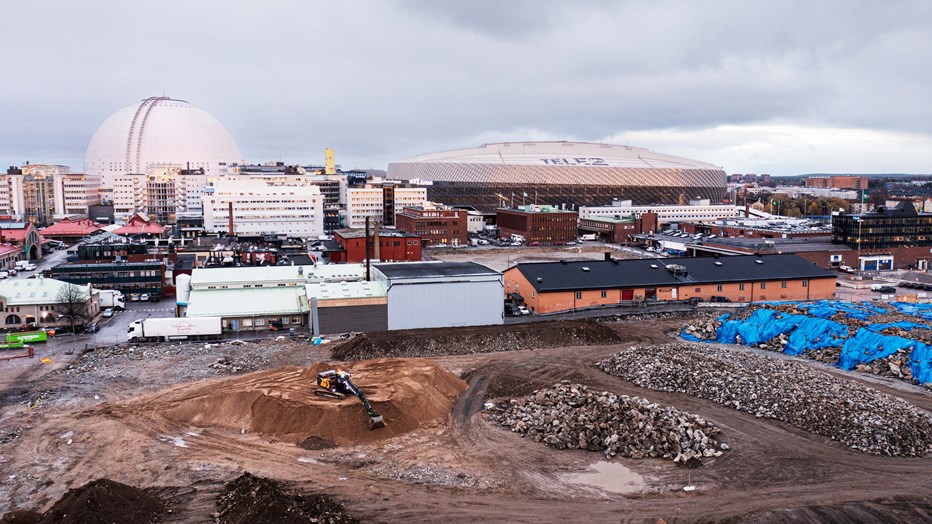A fossil-free construction site
Slakthusområdet, in southern Stockholm, is being transformed into an entirely new district. This area, which is over 100 years old, is getting a makeover and is being transformed into an urban neighborhood with 3,000 residential units, 14,000 workplaces, commerce, and services.
Visitors will be offered food, culture, and experiences here, and the culturally historic buildings will be preserved and mixed with new construction. The whole project is expected to be completed by the year 2033. In total, around 20 construction companies and property developers are involved in the development.
Skanska carries out preparatory work
Skanska has been commissioned by the City of Stockholm to carry out preparatory work. The project name is Slakthusområdet E101, and is expected to be completed by the summer of 2024. Skanska's assignment is to lower and level the ground, where there are currently height differences of up to ten meters. The work is preparatory for the new urban development and connects Slakthusområdet with the existing road network. In total, 75,000 tons of rock and 96,000 tons of soil will be excavated.
The assignment also includes extensive work to lay cables for electricity, fiber optics, water, sewage, and a vacuum waste collection system.
A fossil-free construction site with minimal emissions
The City of Stockholm aims to carry out the project as a fossil-free construction site with the least possible greenhouse gas emissions. An important goal is also that at least ten percent of machine hours be powered by electricity.
The project will become Sweden's largest testbed in an urban environment for fossil-free construction, and will also be an opportunity to test tomorrow's machinery. In total, nearly 35,000 machine hours will be converted to fossil-free operation.
Electric machinery and renewable fuels
Skanska is carrying out the project in collaboration with, among others, Volvo Construction Equipment, providing the new fully electric excavator EC230, and Sandvik, using an electrified drilling rig. In addition to these modern electric machines, all other machinery is running on the renewable fuel HVO100, made from hydrogenated vegetable oil, reducing greenhouse gas emissions by up to 90 percent.
The project aims to save over 2,000 tons of CO2 emissions, which is equivalent to the emissions from 35 trucks driving eight hours a day for a year.
Sustainable material choices
In addition to using fossil-free fuels and electric power, we aim to reduce transportation distances and increase material reuse. The goal is to make sustainable material choices, and one of the products we will use is Skanska's Green asphalt BioZero. This asphalt is produced in a plant that uses fossil-free fuel, contains a high proportion of recycled asphalt, and, in some cases, renewable binders as well.
We have also chosen reinforcing steel and sheet piling with low environmental impact, as well as climate-improved concrete. Furthermore, 95 percent of the mass will be reused on-site.
The project will be environmentally certified according to BREEAM Infrastructure - Excellent.
Significant savings reported at halftime
With the project now at the halfway point, we can report that carbon emission savings have reached 1,808 metric tons, corresponding to the average emissions of 180 Swedes over a year.
The use of electric machines accounts for 421 metric tons of these savings. Running all machinery and all transportation to and from the project on HVO100 fuel (hydrated vegetable oil) has saved 840 metric tons of CO2 so far. Additionally, we have saved a further 547 metric tons by working with circularity, reusing rock and soil masses within the project.
We’re very pleased with our progress, especially when you remember that the total carbon savings target for the project is 2,000 metric tons.


